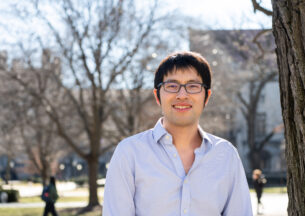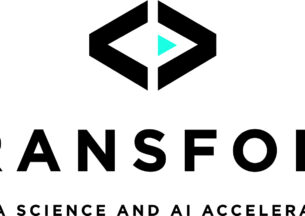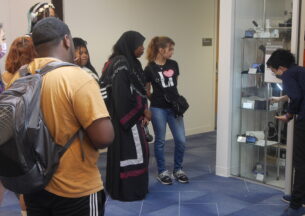Data Ecology: A Socio-Technical Approach to Controlling Dataflows
Assistant Professor of Law Bridget Fahey and Assistant Professor of Computer Science, Raul Castro Fernandez, have developed a novel collaboration over a concept they call “data ecology”. Their work begins with the basic idea that how data is elicited, produced, shared, and used depends on a complex set of technical systems, economic and social incentives, and legal rules. Data ecology integrates the study of these interconnected dynamics and works to isolate and refine the mechanisms — legal and technical — through which individuals, firms, and governments can better control them.

Castro Fernandez first used the term “data ecology” four years ago in research about technical and economic interventions to control how data moves — or, put differently, to control “dataflows.” While the results were promising, they were also incomplete. They excluded an important determinant of data’s movements among individuals, firms, and governmental organizations: legal rules.
The conviction that law was a necessary part of the story led Castro Fernandez to Fahey’s article on Data Federalism. In that article, Fahey describes the legal mechanisms through which data moves (and is at times prevented from moving) between the federal government, states, and localities. That article — though written for a different audience — raised many of the same problems with dataflows that had motivated Castro Fernandez.
Last year, Fahey and Castro Fernandez began a collaboration about Government Data Markets funded by the Neubauer Collegium. Describing the collaboration, Fahey explains, “All levels of government — and many different actors within them — collect data about individuals. Once governmental agents take custody of individual data, they share, pool, exchange, and transfer that data — participating in a kind of governmental data market that operates in many ways similar to, and in some ways different from, private data markets.”
The pair presented some of their results earlier this year. Castro Fernandez and Fahey explained that there is a need for greater control over governmental dataflows and that deepening our understanding of data ecology can help. Consider one important legal intervention: regulation. From timber farming in forests to fishing in the ocean, ecosystems worldwide are regulated by the government to protect people and the environment from exploitation. While data is not a natural resource, in a world increasingly constructed by digital technologies, data has become an increasingly indispensable “resource” in its own right. But legal control over data — including the data held by the government itself — exists, as Fahey has previously explained, in a field of “statutory minimalism.”

“Legislatures spend less time thinking about data than other governmental resources of comparable significance,” Fahey says. The federal government needs, according to Fahey and Castro Fernandez, to rethink how it conceptualizes and regulates data.
To that end, they propose in ongoing work, a series of interventions that integrate legal rules with technical systems to better steward government data assets. By combining insights from computer science and law, Fahey and Castro Fernandez’s work aims to offer the kind of legal-technical solutions that attend to the multiple forces that shape data ecosystems.
What is next for Data Ecology?
Beyond governmental data markets, developing a framework for data ecology has significant implications for various sectors of society. As data increasingly influences everything from healthcare and education to law enforcement and social services, ensuring that data’s stewardship is consistent with our goals and values is important. For instance, the right data ecosystem in healthcare leads to better patient outcomes by facilitating the secure sharing of medical records while also safeguarding patient privacy. In education, data ecology could help create a more personalized learning environment by enabling the safe and ethical use of student data. And companies of all sizes would benefit from interventions that help them better calibrate dataflows.
In the future, Fahey and Castro Fernandez hope to co-teach a seminar about data ecology. They are also continuing their work this year as a Research Initiative at the Data Science Institute and hope to collaborate with many more scholars and students interested in these issues at the university and beyond.
“The two of us are really excited,” Castro Fernandez states. “People ask us, how are a computer scientist and a law professor working together? We recognize that a lot of the problems that we have today are not purely technical. They are socio-technical problems and you really need to be paying attention to what economics and law have to say.”
As Fahey explains, “Data is a force of tremendous good and also a source of great power — including the power to do harm. And the more powerful it is, the more we must be able to control it: and to make it responsive to ordinary processes of democratic control. Doing that is not just a legal problem: it is a legal, technical, economic, and social problem.”
Their seminar and joint research could help shape the policies and technologies governing data use in years to come, helping individuals, companies, and governments control data to fit our values.













